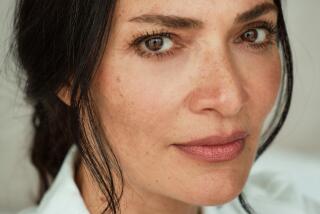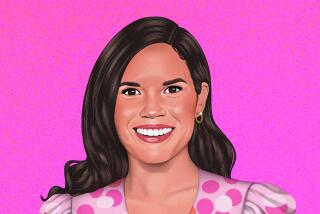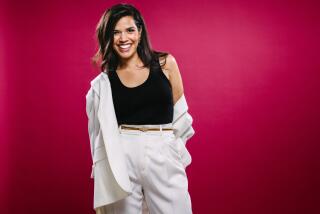Goodbye to an American beauty, ‘Ugly Betty’
After four seasons of bright and noisy comic melodrama, Betty Suarez is leaving us to our own devices, as “Ugly Betty,” which bowed in an explosion of color and fairy-tale tropes in the fall of 2006, rushes toward its end Wednesday night on ABC. Even as a fan of the show, and especially of the people in it — of the actors as inextricable from their characters — I think this is not a bad time, in the fictional and practical life of the series, to say goodbye.
There are only so many hoops these or any characters can be made to jump through before the complications begin to seem completely manufactured, and “Betty,” which was based on a comic Colombian telenovela, has been packed so full of melodramatic event, with so many reversals of fortune and reversals of reversals of fortune, so many revelations and revolutions, so many characters present or unaccounted for — where are you now, Alexis Mead? — that I was sure the series had run at least five years instead of the actual four. And four years is not hay.
Betty has come some way in that time, as she has gradually — and logically, given that she’s been working at a fashion magazine — turned into the image of America Ferrera, the lovely and well-presented screen star who plays her. One by one, the wig, the braces, the brows, the prosthetic padding have gone, and the substance and the surface have come into line, as when the duckling is revealed as a swan, or the frog becomes a princess, or the secretary takes off her glasses and there stands Marilyn Monroe.
Even thus revealed, Ferrera is by the standards of your average TV heroine too broad, too short, too brown, which is part of what made the show valuable. (It was also just fun.) As working-class Mexican Americans, the Suarez family of Queens, N.Y. — including Tony Plana as father Ignacio, the excellent Ana Ortiz as sister Hilda and Mark Indelicato as fashionista nephew Justin — were rare for television, and no less now, sadly, than when we first met them.
A multicultural fantasia that celebrated difference and the acceptance of difference, whether of race, class, sexual orientation or fashion sense, “Ugly Betty” was also unique in its tone, a mix of comedy and melodrama, the funky and the refined, the fanciful and the actual. (Things got more actual, though no less fanciful, when production moved to New York for the third and fourth seasons.)
Yet even when the show wasn’t exactly true to life, as it regularly was not, and even when the mechanisms of the narrative became strained or absurd — Betty’s current sudden offer from “the most powerful publisher in all of Britain” to help run “a sort of younger person’s New Yorker” in London is crazy in so many ways — it produced moments of emotional truth. (This has much to do with the actors, who do subtle work amid the farce and flamboyance.) Amanda’s (Becki Newton) unexpected gasp of happiness at seeing Justin dance with his boyfriend at his mother’s wedding last week — his coming out — was a moment as lovely and moving as anything I’ve seen on TV.
As part of the summing up and the winding down, figures from the past have been brought back and let go, and if the writers seem almost methodically to be making friends of enemies and awarding every character his or heart’s desire — there will be gift baskets for all tonight —- well, why not? It’s entirely in the spirit of the show, with its echoes of Cinderella and “The Wizard of Oz,” that the players should be thus rewarded, and even the villains allowed their heroism. (A special word here for Michael Urie, as the conflicted amanuensis of Vanessa Williams’ ice queen Wilhelmina, especially good this last season, as he became Justin’s confidant.)
Notwithstanding the odd fruitless detour, they have served us well, these four seasons. The show ends, as it began: a story of renewal, of identity claimed and proclaimed, of lighting out for the territories.
More to Read
The complete guide to home viewing
Get Screen Gab for everything about the TV shows and streaming movies everyone’s talking about.
You may occasionally receive promotional content from the Los Angeles Times.







